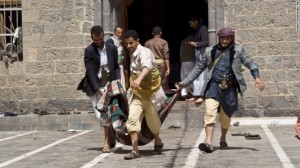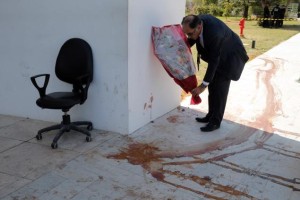By Kathryn Maureen Ryan
Impunity Watch, Managing Editor
DAMASCUS, Syria – A team of United Nations Investigators have begun sharing details from their secret database on Syrian war crimes with European Authorities pursing domestic court cases. The Database contains detailed information on suspected war crimes committed in Syria during the course of the country’s Civil War which has now entered its fifth year. The move by the investigators could pave the way for the perpetrators of mass atrocities including killing and torture on all sides of the brutal conflict to be brought to justice. The goal is to go around the deadlocked United Nations Security Council, where Russia and China, which hold veto power, have prevented the cases from being referred to the International Criminal Court (ICC) for prosecution.
Paulo Pinheiro, the chairman of the United Nations’ commission of inquiry, urged national authorities to contact the independent investigators who have compiled five confidential lists of suspected war crimes over nearly four years. Pinheiro and his team of investigators, including former U.N. war crimes prosecutor Carla del Ponte, said last month they planned to publish names of the suspected perpetrators of atrocities in Syria and push for new ways to bring them to justice, especially if the Security Council continues to fail to act.
Carla Del Ponte, who served as the former chief prosecutor of the International Criminal Tribunal For Former Yugoslavia (ICTY), which was established to investigate suspected war crimes committed during the Balkan conflicts in the 1990s, argued that that the International Criminal Tribunal For Former Yugoslavia serves as an example of how an ad-hoc tribunal could eventually be established to bring justice to Syria. Del Ponte; “At the beginning I was for the ICC but now with the changing situation, I think an ad-hoc tribunal could be more efficient and work faster,” Del Ponte told the Guardian in an interview in Geneva. “First of all, the ICC would prosecute only three, four, five perpetrators, not more. I think an ad-hoc tribunal could prepare a list of over a hundred, like the tribunal for the former Yugoslavia … An ad-hoc tribunal could also be based near the region, facilitating access of witnesses, documentation and so on.”
The Assad Regime’s Ambassador to the United Nations, Hussam Edin Aala, dismissed the database created by the four year investigation claiming that a “biased and selective approach” was used by the United Nations investigators. He also claimed they had ignored crimes by Islamist insurgent groups. The regime of Syrian President Bashar al-Assad has been accused of committing war crimes and crimes against Humanity throughout the civil war, which began when the regime turned its guns on peaceful protesters demanding democratic reforms. More than 200,000 people have been killed during the Syrian Civil War which began in 2011.
For more information please see:
Al Arabiya – U.N. Investigators to Share Syria War Crimes List – 17 March 2015
The Daily Mail – UN Investigators to Share Names Of Syria War Crimes Suspects – 17 March 2015
The Guardian – Call for Special Tribunal to Investigate War Crimes and Mass Atrocities in Syria – 17 March 2015
Reuters – U.N. Investigators Sharing Syria War Crimes Findings with European Authorities – 17 March 2015

